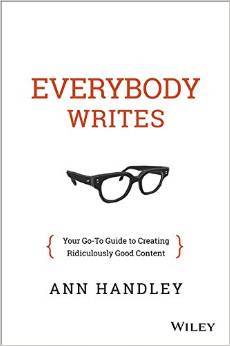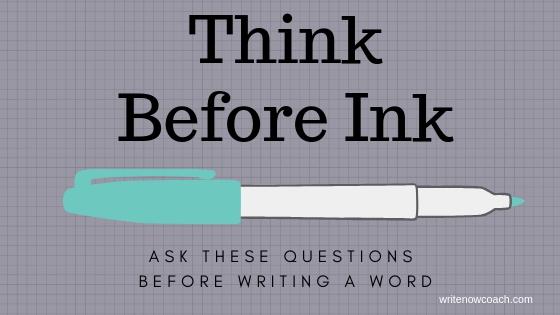Ask These Questions Before Writing a Word
Think before Ink:
Ask These Questions
Before Writing a Word
by Rochelle Melander
“It’s not the ink—it’s the think.” –Robert Mankoff, New Yorker Cartoon editor
My clients often complain about showing up to write and discovering they have nothing to say. They stare at the page, jot down a few words, and then cross them out. Somehow, all of their ideas for their blog post or book chapter are gone. They don’t know where to start or how to continue. They distract themselves with cleaning their office, hanging out on social media, or checking their email. Then they try again. If they can’t get any words down on paper, they berate themselves and end up quitting, hoping that next time goes better.
Have you been there? I certainly have. And it’s easy to take experiences like this and believe it reflects on our talent or skill. We might say, “I don’t have what it takes to write a book.” You begin to believe that YOU are the problem.
You’re not the problem.
The process is the problem.
When we show up to write and have nothing to say, it’s often because we’ve skipped a key part of the process: thinking time. As Robert Mankoff, New Yorker Cartoon editor, said: “It’s not the ink—it’s the think.”
Do you remember the last time you had a great writing session? You knew what point you wanted to make, how you would illustrate it with information and stories, and why this mattered to your readers. No doubt you knew all of this because you had spent time THINKING about what you wanted to write. Maybe you thought through the section in your head as you exercised. Or perhaps you planned it all out during your morning journaling time. When we take time to think about our post or project before we write it, we show up full of ideas and energy to write.
What to think about
 In Everybody Writes, digital marketing expert Ann Handley teaches readers to ask three questions before they write anything:
In Everybody Writes, digital marketing expert Ann Handley teaches readers to ask three questions before they write anything:
WHY am I writing this? What is my purpose?
WHAT is my point of view? What do I want to say?
SO WHAT? Why does this matter to the reader?
(Everybody Writes, pp. 33-35)
Record your thoughts
A few weeks ago, I wrote about how prewriting helps us to write by eliminating the blank page. Prewriting is essentially THINKING ON PAPER.
Whether you decide to do your THINKING on paper or in your head, at some point you will need to record your thoughts.
When I write a book, I keep a journal for the book. That journal becomes my go-to place for recording ideas and mind-mapping chapters. But you can record your thoughts in any place that works for you—your regular paper journal, a document on your computer, an audio recorder, or any combination of these. If you do your best thinking while walking, take along a small notebook, index cards, or your phone to record ideas.
Your turn
What questions do you need to ask and answer before writing?









